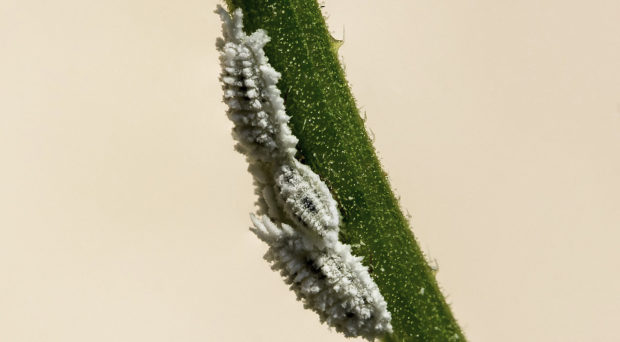
Genomic imprinting is a phenomenon in which the expression of a gene depends on its parental origin, hence expression is said to be parent-of-origin specific. This process is independent of the laws of Mendelian inheritance meaning that although you receive two copies of a gene, one from each parent, one of those copies is favored depending on which parent it came from.
This phenomenon was generally believed to be exclusive to mammals and flowering plants, where it has been extensively studied over the past decades.
However, genomic imprinting has independently evolved at least 7 times across the arthropods – a group of invertebrates which includes insects.
My PhD investigates arguably one of the most astounding cases of genomic imprinting: Paternal Genome Elimination (PGE). This process is found in several insect species, including our research model organism, the citrus mealybug (Planococcus citri).
In male mealybugs, the genetic information that they receive from their father is condensed into a silenced state in most of their tissues. Furthermore, males do not package paternally inherited genes into the sperm they produce.
Therefore, despite developing from fertilized eggs and receiving genes from both parents, males only express the half of their genome that they inherit from their mother and can only transmit maternally-inherited genes to their offspring.
PGE appears to be regulated by epigenetic mechanisms similar to those involved in mammalian imprinting
Since, in evolutionary terms, an individual’s fitness is measured by its ability to pass on its genes to future generations, our research group is interested in how a reproductive strategy such as PGE could have evolved and persisted in these species.
The role of epigenetics
My research focuses on understanding how the parental origin of genes is identified and how the processes of silencing and elimination are carried out in males.
Interestingly, PGE appears to be regulated by epigenetic mechanisms similar to those involved in mammalian imprinting, namely DNA methylation and histone modifications. These are DNA modifications that do not alter DNA sequence itself but change how it is processed, for example, certain epigenetic modifications may condense the DNA preventing the expression of a protein.
However, recent work on a number of insect species suggests that there are differences in how epigenetic mechanisms work amongst different taxonomic groups. A key example is DNA methylation, although it is associated with silencing in mammals, it is either absent or associated with high expression in insects.
To better understand the mechanisms underlying PGE, I am analyzing DNA methylation patterns in the mealybug to determine whether patterns on genes are dependent on their parental origin i.e. do genes inherited from dad have different DNA methylation levels to those inherited from mum? This should provide some insight into how the parental origin of genetic information is identified. I am also investigating the role of histone modifications in the silencing and elimination processes that occur in males.
Understanding how paternal genome elimination operates will provide general insights into the epigenetic toolbox of life. Parent-of-origin specific gene expression plays an important role during the early development of mammals – including humans – and our research provides the opportunity to develop an invertebrate model system for studying parent-of-origin effects that is currently unavailable to the scientific community.
Stevie Bain
Latest posts by Stevie Bain (see all)
- Paternal genome elimination: investigating a strange reproductive strategy - 13th December 2017
Comments